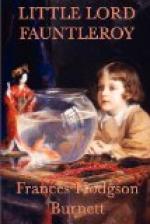“God bless your lordship!” said the courtesying, red-cloaked old woman who had spoken to his mother; “long life to you!”
“Thank you, ma’am,” said Fauntleroy. And then they went into the church, and were looked at there, on their way up the aisle to the square, red-cushioned and curtained pew. When Fauntleroy was fairly seated, he made two discoveries which pleased him: the first that, across the church where he could look at her, his mother sat and smiled at him; the second, that at one end of the pew, against the wall, knelt two quaint figures carven in stone, facing each other as they kneeled on either side of a pillar supporting two stone missals, their pointed hands folded as if in prayer, their dress very antique and strange. On the tablet by them was written something of which he could only read the curious words:
“Here lyeth ye bodye of Gregorye Arthure Fyrst Earle of Dorincourt Allsoe of Alisone Hildegarde hys wyfe.”
“May I whisper?” inquired his lordship, devoured by curiosity.
“What is it?” said his grandfather.
“Who are they?”
“Some of your ancestors,” answered the Earl, “who lived a few hundred years ago.”
“Perhaps,” said Lord Fauntleroy, regarding them with respect, “perhaps I got my spelling from them.” And then he proceeded to find his place in the church service. When the music began, he stood up and looked across at his mother, smiling. He was very fond of music, and his mother and he often sang together, so he joined in with the rest, his pure, sweet, high voice rising as clear as the song of a bird. He quite forgot himself in his pleasure in it. The Earl forgot himself a little too, as he sat in his curtain-shielded corner of the pew and watched the boy. Cedric stood with the big psalter open in his hands, singing with all his childish might, his face a little uplifted, happily; and as he sang, a long ray of sunshine crept in and, slanting through a golden pane of a stained glass window, brightened the falling hair about his young head. His mother, as she looked at him across the church, felt a thrill pass through her heart, and a prayer rose in it too,—a prayer that the pure, simple happiness of his childish soul might last, and that the strange, great fortune which had fallen to him might bring no wrong or evil with it. There were many soft, anxious thoughts in her tender heart in those new days.
“Oh, Ceddie!” she had said to him the evening before, as she hung over him in saying good-night, before he went away; “oh, Ceddie, dear, I wish for your sake I was very clever and could say a great many wise things! But only be good, dear, only be brave, only be kind and true always, and then you will never hurt any one, so long as you live, and you may help many, and the big world may be better because my little child was born. And that is best of all, Ceddie,—it is better than everything else, that the world should be a little better because a man has lived—even ever so little better, dearest.”




